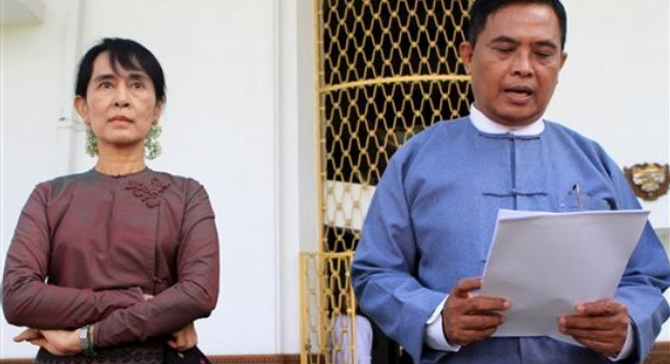Burmese Labor Minister Aung Kyi urged pro-democracy leader Aung San Suu Kyi to legally register her party, the National League for Democracy (NLD), when they met on Monday for the first talks between the two sides since a new government was formed earlier this year, according to sources.
Sources close to the NLD said that Suu Kyi rejected the suggestion, however, because the party doesn't accept the 2008 Constitution, which set down the new registration regulations.
The NLD lost its legal status last year on May 6 because it failed to re-register in order to take part in November general election. The party boycotted the polls, which it considered unfair and undemocratic.
Among the various restrictions imposed under the election laws, the NLD would have been required to expel Suu Kyi from the party she founded more than 20 years ago because of her marriage to a foreigner. The military-backed constitution also contains clauses that would bar her from holding political office.
Following Suu Kyi's release from house arrest last year, less than a week after the Nov. 7 election, the NLD took the case concerning its legal standing to court four times. However, Naypyidaw’s Supreme Court dismissed the NLD’s special appeal against dissolution early this year.
Since then, the NLD has decided to submit a letter of appeal to the UN Human Rights Council to challenge the government's efforts to eliminate Burma’s most influential political party.
“We feel that there is no way to win legal recognition of the NLD under domestic law, so we are preparing to submit a letter to the UN Human Rights Council,” NLD vice chairman Tin Oo told The Irrawaddy on Wednesday.
Aung Kyi reportedly called such a move “inappropriate” during his talks with Suu Kyi, according to sources.
Last month, the state-run newspaper The New Light of Myanmar reported that the Home Ministry sent a letter to Suu Kyi and NLD Chairman Aung Shwe informing them that the party was breaking the law by maintaining party offices, holding meetings and issuing statements.
The government also told Suu Kyi ahead of her trip to Pagan earlier this month to halt all political activities and warned that her tour could spark riots and chaos. Although the trip was billed as a private visit to Burma's ancient capital, hundreds of emotional supporters flocked to see her.
Despite signs of tension between Suu Kyi and the government, however, on July 19 she was permitted to attend a ceremony commemorating the 1947 assassination of her father, independence leader Aung San. More than 3,000 people followed her on a march to the Martyrs' Mausoleum in Rangoon, but no incidents were reported.
Some observers said that Suu Kyi would likely continue to seek opportunities to demonstrate that her actions are not intended to lead to confrontation. Others suggested that both sides needed to do more to ease tensions.
“They should seek to build trust between them by holding a series of meetings aimed at cooperating and fulfilling the needs of the country,” said Khin Maung Swe, a former member of the NLD and founding member of the National Democratic Force, a party formed to run in last year's election.

